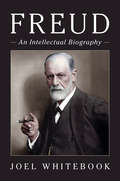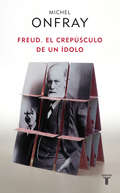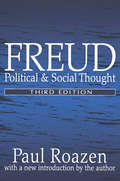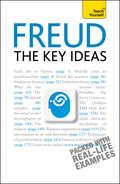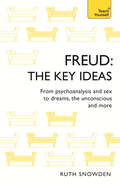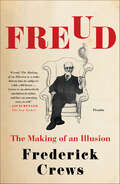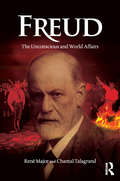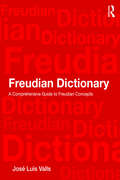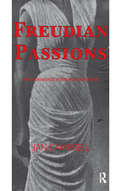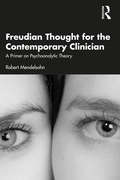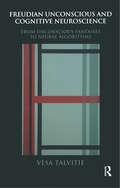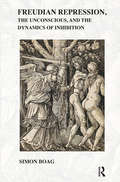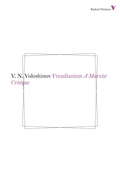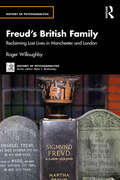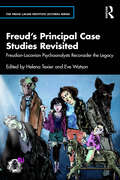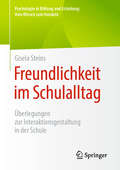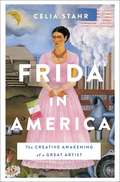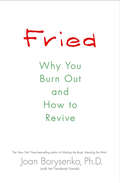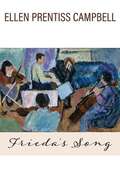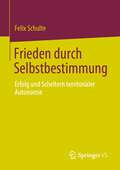- Table View
- List View
Freud: An Intellectual Biography (Berkeley Forum In The Humanities Ser.)
by Joel WhitebookThe life and work of Sigmund Freud continue to fascinate general and professional readers alike. Joel Whitebook here presents the first major biography of Freud since the last century, taking into account recent developments in psychoanalytic theory and practice, gender studies, philosophy, cultural theory, and more. Offering a radically new portrait of the creator of psychoanalysis, this book explores the man in all his complexity alongside an interpretation of his theories that cuts through the stereotypes that surround him. The development of Freud's thinking is addressed not only in the context of his personal life, but also in that of society and culture at large, while the impact of his thinking on subsequent issues of psychoanalysis, philosophy, and social theory is fully examined. Whitebook demonstrates that declarations of Freud's obsolescence are premature, and, with his clear and engaging style, brings this vivid figure to life in compelling and readable fashion.
Freud: Bullet Guide
by Robert AndersonOpen this book and you will Grasp psychoanalysis Master Freudian theories Explore key concepts Understand his influence
Freud: Bullet Guide
by Robert AndersonOpen this book and you will Grasp psychoanalysis Master Freudian theories Explore key concepts Understand his influence
Freud: Dictionary of Psychoanalysis
by Nandor Fodor Frank GaynorThis book comprises Freud's dictionary on Psychoanalysis and would be a useful tool for all interested in Psychology.
Freud: El crepúsculo de un ídolo
by Michel OnfrayEl prestigioso filósofo francés Michel Onfray, autor del best seller Tratado de ateología, ha escrito un ataque virulento contra el psicoanálisis, y en particular contra el freudismo, vehementemente argumentado y que ha creado una gran polémica en Francia. Onfray parte en este libro de una idea simple pero radical: Freud quiso construir una «ciencia» y no lo consiguió; quiso «probar» que el inconsciente tenía sus leyes, su lógica intrínseca, sus protocolos de experimentación, y usó todos los medios a su alcance para adornar el psicoanálisis con la apariencia de lo científico. Con gran rigor, Michel Onfray reexamina las obras de Freud, así como su biografía, para desvelar sus inconsistencias y contradicciones y ofrecer una conclusión implacable: el psicoanálisis no es más que el producto de influencias de la psicología, de la literatura y de la filosofía, pero en ningún caso es la ciencia a la que aspiraba su fundador. La crítica ha dicho...«Un ensayo potente, inteligente e inquietante, escrito de manera simple y directa, hábilmente argumentado y organizado en torno a una tesis sistemáticamente desarrollada.»Robert Maggiori, Libération «Un libro tan contundente como Tratado de ateología.»Livres Hebdo «No solo importante sino también apasionante. Este libro ya es un clásico. Como dice Onfray, ya era hora de sacar a Freud de la leyenda para introducirlo en la historia, donde será discutido, atacado y, por supuesto, defendido.»Le Point «Dejando atrás el freudismo de postal, Onfray se entrega a la deconstrucción de un sistema.»L'Express «Un gran incendio mediático.»Paris Match
Freud: Political and Social Thought (Psychoanalysis)
by Paul RoazenSigmund Freud had broad ambitions about what psychoanalysis could add to human thought. But Freutfs own writings have rarely been assessed within the perspective of political philosophy. Political theorists will find in the school Freud established a rich storehouse of ideas. For us to link up with what Freud was saying means to join in the great conversation about what the ends of the just society should be, as well as what a fully developed person might be like. Written more than twenty years ago, the central interpretive theses found in Freud: Political and Social Thought still ring true.In his new introduction to this classic text, Paul Roazen contends that today, from the point of view of intellectual history, Freud looms as a subject in an even larger way than he did back in the 1960s. His thinking has impinged, for good or ill, on how we think about character and the nature of human impulses. Privacy itself has been affected, so much so that political candidates now feel free to use intimate material from private life for manipulative public purposes. Yet after all this time political scientists remain reluctant to entertain the need to explore the psychological dimension of all political events.Without reducing politics to psychoanalysis, or inflating psychological categories to embrace all of politics, Roazen provides an introductory look at the field of psychoanalysis. By bringing together the different disciplines of psychology and politics he breaks through parochialism. Roazen is no advocate for psychoanalysis, but believes that analysts have as much to learn from social science as the other way around. This volume is proof that at its best political theory has to be inherently interdisciplinary. As such, this volume will be of interest to intellectual historians, psychoanalysts, and political theorists.
Freud: Psychoanalysis, dreams, the unconscious and more
by Ruth SnowdenReading the complete works of Sigmund Freud would take more time than most of us have to spare. Freud - the Key Ideas condenses all the information you need about the life and work of the great man into one book. With clear explanations and examples drawn from Freud's own cases you will soon have a solid understanding of the main concepts, from psychosexual development to dream analysis.NOT GOT MUCH TIME?One, five and ten-minute introductions to key principles to get you started.AUTHOR INSIGHTSLots of instant help with common problems and quick tips for success, based on the author's many years of experience.TEST YOURSELFTests in the book and online to keep track of your progress.EXTEND YOUR KNOWLEDGEExtra online articles at www.teachyourself.com to give you a richer understanding of Freud.FIVE THINGS TO REMEMBERQuick refreshers to help you remember the key facts.TRY THISInnovative exercises illustrate what you've learnt and how to use it.
Freud: Psychoanalysis, dreams, the unconscious and more (TY Philosophy)
by Ruth SnowdenReading the complete works of Sigmund Freud would take more time than most of us have to spare. Freud - the Key Ideas condenses all the information you need about the life and work of the great man into one book. With clear explanations and examples drawn from Freud's own cases you will soon have a solid understanding of the main concepts, from psychosexual development to dream analysis.NOT GOT MUCH TIME?One, five and ten-minute introductions to key principles to get you started.AUTHOR INSIGHTSLots of instant help with common problems and quick tips for success, based on the author's many years of experience.TEST YOURSELFTests in the book and online to keep track of your progress.EXTEND YOUR KNOWLEDGEExtra online articles at www.teachyourself.com to give you a richer understanding of Freud.FIVE THINGS TO REMEMBERQuick refreshers to help you remember the key facts.TRY THISInnovative exercises illustrate what you've learnt and how to use it.
Freud: Psychoanalysis, dreams, the unconscious and more (TY Philosophy)
by Ruth SnowdenReading the complete works of Sigmund Freud would take more time than most of us have to spare. Freud - the Key Ideas condenses all the information you need about the life and work of the great man into one book. With clear explanations and examples drawn from Freud's own cases you will soon have a solid understanding of the main concepts, from psychosexual development to dream analysis.AUTHOR INSIGHTSLots of instant help with common problems and quick tips for success, based on the author's many years of experience.TEST YOURSELFTests in the book and online to keep track of your progress.EXTEND YOUR KNOWLEDGEExtra online articles at www.teachyourself.com to give you a richer understanding of Freud.FIVE THINGS TO REMEMBERQuick refreshers to help you remember the key facts.TRY THISInnovative exercises illustrate what you've learnt and how to use it.
Freud: Psychoanalysis, dreams, the unconscious and more (Teach Yourself Philosophy Ser.)
by Ruth SnowdenReading the complete works of Sigmund Freud would take more time than most of us have to spare. Freud - the Key Ideas condenses all the information you need about the life and work of the great man into one book. With clear explanations and examples drawn from Freud's own cases you will soon have a solid understanding of the main concepts, from psychosexual development to dream analysis.AUTHOR INSIGHTSLots of instant help with common problems and quick tips for success, based on the author's many years of experience.TEST YOURSELFTests in the book and online to keep track of your progress.EXTEND YOUR KNOWLEDGEExtra online articles at www.teachyourself.com to give you a richer understanding of Freud.FIVE THINGS TO REMEMBERQuick refreshers to help you remember the key facts.TRY THISInnovative exercises illustrate what you've learnt and how to use it.
Freud: The Making of an Illusion
by Frederick CrewsFrom the master of Freud debunkers, the book that definitively puts an end to the myth of psychoanalysis and its creatorSince the 1970s, Sigmund Freud’s scientific reputation has been in an accelerating tailspin—but nonetheless the idea persists that some of his contributions were visionary discoveries of lasting value. Now, drawing on rarely consulted archives, Frederick Crews has assembled a great volume of evidence that reveals a surprising new Freud: a man who blundered tragicomically in his dealings with patients, who in fact never cured anyone, who promoted cocaine as a miracle drug capable of curing a wide range of diseases, and who advanced his career through falsifying case histories and betraying the mentors who had helped him to rise. The legend has persisted, Crews shows, thanks to Freud’s fictive self-invention as a master detective of the psyche, and later through a campaign of censorship and falsification conducted by his followers.A monumental biographical study and a slashing critique, Freud: The Making of an Illusion will stand as the last word on one of the most significant and contested figures of the twentieth century.
Freud: The Unconscious and World Affairs
by Rene Major Chantal TalagrandThis book sheds a new light on Freud who, from the beginning, was aware that the edifice he was constructing – psychoanalysis – which revealed in each individual an "ego not master in its own house" –, had clear implications for understanding collective human behaviour. This man was profoundly concerned with matters of peace and war, religion, morality and civilisation. The authors’ political focus is unusual, and their choice of quotes from lesser-known sources holds great interest. Freud’s interlocutors include Oskar Pfisrer, Swiss pastor and lay analyst; Einstein; and the American diplomat William Bullitt, with whom Freud wrote a study of President Wilson, entitled Thomas Widrow Wilson. A Psychological Study. In the Introduction to this book, written in 1930, Freud describes Wilson as a person for whom mere facts held no significance; he esteemed highly nothing but human motives and opinions.
Freudian Dictionary: A Comprehensive Guide to Freudian Concepts
by José VallsThe Freudian Dictionary provides a comprehensive and accessible guide to essential Freudian terms and concepts. Organized conceptually, the book is grounded in detailed and meticulous readings, and covers the full range of Freud’s writings and subjects. It also provides an overview of the development, vicissitudes, and syntheses of Freud’s unique lines of thought. Contemporary developments in psychoanalytic thought have aspired to surpass their Freudian origins. But this comprehensive guide to Freud’s work provides a touchstone for those wishing to clarify these roots, and the foundations of the discipline itself. It will be a valuable companion to psychoanalysts in practice and training across a range of schools, as well as a reference work for sociologists, artists, philosophers, historians and other scholars.
Freudian Passions: Psychoanalysis, Form and Literature
by Jan CampbellFreud's thinking about the unconscious has always been seen to be more about representations than affects. When it came to the passions of the transference and the demands of his hysterical patients, Freud was always more interested, wanted to move the focus away from the transference, and onto dreams. Hidden wishes more than manifest ones were what captured his imagination and style. This book returns to the repressed theory of passions in Freud's own thinking, arguing that the repression, fixation and rhythmic movement of affects make up the roots and branches of psychoanalytic thinking. We can think of Freud's unconscious affects as a tree, with the most passionate and primitive affects that make up the core of our psychic life, moving and branching out into more elaborated emotions and representations. So what moves this tree: the house of our first passions? How we move the tree of our affects, or leave it, is integral to Freud's understanding of sexuality and the Oedipal Complex.
Freudian Thought for the Contemporary Clinician: A Primer on Psychoanalytic Theory
by Robert MendelsohnThis book uses clear language, modern contexts and key psychoanalytic concepts to exemplify how Sigmund Freud’s thinking and legacy is directly relevant to contemporary therapists. Interweaving theory with history, Freudian Thought for the Contemporary Clinician allows readers to take a walk in Freud’s shoes, offering a new framework for understanding his arcane language and the cultural mores of the early 20th century. Robert Mendelsohn explores topics including sexuality and gender, racial injustice and cultural differences with direct reference to Freud’s cases, demonstrating how traditional psychoanalytic ideas may inform solutions to issues we face today. Featuring clinical examples and philosophical explorations delivered in an accessible style, Freudian Thought for the Contemporary Clinician will be a key text for psychoanalytic clinicians in practice and in training. It will also be of great interest to academics and scholars of psychoanalytic studies, the history of psychology and the history of ideas.
Freudian Unconscious and Cognitive Neuroscience: From Unconscious Fantasies to Neural Algorithms
by Vesa TalvitieThe aim of Freudian Unconscious and Cognitive Neuroscience is to create a conception of the "Freudian things" around the unconscious that takes seriously both the clinical data gathered in the scope of psychoanalytic clinical practice during the past 110 years, and the empirical and theoretical achievements of cognitive neuroscience and evolutionary theory. Tensions between the psychoanalytic and other views give a hint that the task is anything but easy.
Freudian repression, the Unconscious, and the Dynamics of Inhibition
by Simon BoagPossibly no other psychoanalytic concept has caused as much ongoing controversy, and attracted so much criticism, as that of 'repression'. Repression involves denying knowledge to oneself about the content of one's own mind and is most commonly implicated in disputes concerning the possibility of repressed memories of trauma (and their subsequent recovery). While fundamental in Freudian psychoanalysis, recent developments in psychoanalytic thinking (e.g., 'mentalization') have downplayed the importance of repression, in part due to less emphasis being placed on the importance of memory within therapy.
Freudianism
by I. R. Titunik Valentin Voloshinov Neal BrussFreudianism is a major icon in the history of ideas, independently rich and suggestive today both for psychoanalysis and for theories of language. It offers critical insights whose recognition demands a change in the manner in which the fundamental principles of both psychoanalysis and linguistic theory are understood. Volosinov went to the root of Freud's theory adn method, arguing that what is for him the central concept of psychoanalysis, "the unconscious," was a fiction. He argued that the phenomena that were taken by Freud as evidence for "the unconscious" constituted instead an aspect of "the conscious," albeit one with a person's "official conscious."For Volosinov, "the conscious" was a monologue, a use of language, "inner speech" as he called it. As such, the conscious participated in all of the properties of language, particularly, for Volosinov, its social essence. This type of argumentation stood behind Volosinov's charge that Freudianism presented humans in an inherently false, individualistic, asocial, and ahistorical setting.
Freud’s British Family: Reclaiming Lost Lives in Manchester and London (The History of Psychoanalysis Series)
by Roger WilloughbyFreud’s British Family presents ground-breaking research into the lives of the British branch of the Freud family, their connections to the founder of psychoanalysis, and into Freud’s relationship to Britain.Documenting the complex relationships the elder Freud brothers had with their much younger brother Sigmund, Freud’s British Family reveals the significant influence these hitherto largely forgotten Freuds had on the mental economy of the founder of psychoanalysis. Roger Willoughby shows how these key family relationships helped shape Freud’s thinking, attitudes, and theorising, including emerging ideas on rivalry, the Oedipus complex, character, and art. In addition to considering their correspondence and meetings with Freud in continental Europe, the book carefully documents Freud’s own visits to his brothers and to Britain in 1875 and again in 1908. Freud’s British Family concludes with a discussion of Freud’s final 15 months in London after he left Nazi Vienna as a refugee. Freud’s British Family offers a rich, contextualised understanding of the sibling, familial, and socio-cultural ties that went into forming the tapestry of psychoanalysis.Freud’s British Family will be of great interest to psychoanalysts and psychotherapists in practice and in training, and to scholars of the history of psychoanalysis, twentieth century history, psychosocial studies, and Jewish studies.
Freud’s Principal Case Studies Revisited: Freudian-Lacanian Psychoanalysts Reconsider the Legacy (The Freud Lacan institute Lectures series)
by Eve Watson Helena TexierFreud’s Principal Case Studies Revisited explores Freud’s six principal case studies studies – Dora, Little Hans, Schreber, the Wolf Man, the Rat Man and the Young Homosexual Girl – through the lens of contemporary psychoanalytic practice.Thirteen leading Freudian-Lacanian psychoanalysts reassess these cases in light of their significance to psychoanalytic theory and practice and consider their relevance in the twenty-first century. With new case material, theory, and analysis, the cases are critically re-invigorated and restored to a privileged place within psychoanalysis. Each of the cases is approached via a pairing of two psychoanalysts who engage with the clinical material, as well as with each other, in addressing their contributions to an assembled audience of clinicians, trainees and scholars. This book will be of great interest to psychoanalysts in practice and in training as well as psychologists, psychotherapists and psychiatrists. It will also be relevant for academics and students of psychoanalytic studies, philosophy, critical and cultural theory, social studies, critical psychology, gender and sexuality studies and queer theory.
Freundlichkeit im Schulalltag: Überlegungen zur Interaktionsgestaltung in der Schule (Psychologie in Bildung und Erziehung: Vom Wissen zum Handeln)
by Gisela SteinsWer im Lehrberuf ist, steht in einem lebhaften Austausch mit den heranwachsenden Generationen. Wenn auch relativ zu den Eltern in geringerem Ausmaß, beeinflussen auch Lehrer/-innen durch ihren häufigen und zeitintensiven Umgang in einem relativ geschlossenen Kontext systematisch die Vorstellungen von Heranwachsenden über sich selbst, andere Menschen und die Welt. Die Gestaltung dieser Zeit wird erheblich durch die Interaktionsgestaltung zwischen Lehrenden und Lernenden beeinflusst. In diesem Band wird das gegenwärtige, auf empirischer Evidenz beruhende Ideal einer Beziehungsgestaltung erarbeitet, in dem der Begriff der Zuwendung eine wichtige Grundlage bildet. Ziel des Bandes ist es, Anregungen zur Reflexion des eigenen Interaktionsstils zu geben. Dieser Band ist also ein etwas anderer, ungewöhnlicher Blick auf das Schüler/-innen/Lehrkraft/Verhältnis: der Freundlichkeit als grundlegendem Gestaltungsprinzip wird ein besonderer legitimer Platz eingeräumt.
Frida in America: The Creative Awakening of a Great Artist
by Celia StahrThe riveting story of how three years spent in the United States transformed the Mexican artist/painter Frida Kahlo (1907-1954) into the artist we know today. Frida Kahlo adored adventure. In November 1930, she was thrilled to realize her dream of traveling to the United States, where she would spend time in San Francisco, Detroit, and New York. Still, leaving her family and her country for the first time was monumental. Only twenty-three and newly married to the already world-famous and much older Diego Rivera, she was at a crossroads in her life. The United States, with its magnificent beauty, horrific poverty, racial tension, anti-Semitism, ethnic diversity, bland midwestern food, and thriving music scene, pushed Frida in unexpected directions. Shifts in her style of painting began to appear, cracks in her marriage widened, and tragedy struck, twice, while she was living in Detroit. Frida in America is the first in-depth biography of these formative years spent in “Gringolandia,” a place that both fascinated and angered Frida. However, it was precisely her feelings of being a stranger in a strange land that fueled her creative passions and an even stronger sense of Mexican identity. With vivid detail, Frida in America re-creates the pivotal journey that turned Senora Rivera into the world-famous Frida Kahlo. CELIA STAHR is a professor at the University of San Francisco, where she specializes in modern American and contemporary art with an emphasis on feminist art and gender studies, as well as African and multicultural art. She holds a PhD in Art History from the University of Iowa and lives in the Bay Area.
Fried: Why You Burn Out And How To Revive
by Joan BorysenkoThis Is an Invitation to Take Your Power Back! What happened to the spark you had as a child that powered curiosity, engagement with life, and creativity? Has it burned out? Are you feeling emotionally and physically exhausted and cynical, wondering if you’ve got what it takes to make it in this rapidly changing world? Burnout looks a lot like depression, but it’s not a biological bogeyman that medication or simple stress management can cure. It’s a disorder of hope and will that sucks the life out of competent, idealistic, hardworking people like you; and it will be an ongoing challenge for you to take your power back! In this breakthrough work, Joan Borysenko, Ph.D.—a Harvard-trained medical scientist, psychologist, and renowned pioneer in stress and health—straddles psychology, biology, and soul in a completely fresh approach to burnout. Joan’s deeply human (and often amusing) personal accounts of burnout and recovery; the science of helplessness, hopelessness, and empowerment; and the rich wisdom of people who have gone from fried to revived—including many of Joan’s vibrant community of 5,000 Facebook Friends—make this powerful and practical book a must-read for our times.
Frieda's Song: A Novel
by Ellen Prentiss CampbellThis novel tells two interlocking stories: the story of psychoanalyst Frieda Fromm-Reichmann, who treated the young woman made famous in the novel I Never Promised You a Rose Garden; and Eliza Kline, a social worker who lives in Frieda's cottage seventy years later. Frieda struggles to adapt to life in the US while Hitler ravages her native Austria, and Eliza worries about her teenage son, who seems increasingly angry and alienated. As Eliza struggles to communicate with Nick, Frieda becomes her mentor and confidante in absentia.
Frieden durch Selbstbestimmung: Erfolg und Scheitern territorialer Autonomie
by Felix SchulteSeit Ende des Kalten Krieges wurden in mehr als 200 Friedensverträgen Autonomieabkommen vereinbart. Während manche Autonomielösungen ethnische Selbstbestimmungskonflikte erfolgreich regulieren konnten, sind andere gescheitert. Wann also funktioniert Autonomie? Dieses Buch verbindet Ansätze aus der Politikwissenschaft, der Konfliktforschung und der Sozialpsychologie und entwickelt eine neue Theorie zur Erklärung von Autonomieerfolg und -scheitern. Diese beschreibt einen initiierten Prozess der ethnischen Anerkennung als Grundlage für ein friedliches Zusammenleben in multiethnischen Post-Konfliktgesellschaften. Während territoriale Autonomiearrangements hierfür einen geeigneten institutionellen Rahmen bieten, ist dieser Anerkennungsprozess stark kontextabhängig. Die Studie identifiziert hierfür kausal relevante Faktoren und analysiert deren Auftreten in den Konsolidierungsphasen von 19 Autonomien weltweit mittels Qualitative Comparative Analysis (QCA) und theorietestenden Prozessanalysen. Die Studie zeigt, dass Autonomieerfolg in der Tat von einer spezifischen Kombination von strukturellen und akteurszentrierten Erfolgsfaktoren abhängt. Ethnische Eliten akzeptieren Autonomiereformen, wenn diese ein hohes Maß an Selbstbestimmung mit sich bringen und gleichzeitig der Anerkennungsprozess nicht durch ausgeprägte Ungleichheiten behindert wird. Elitenkooperationen gelingen in demokratisch-inklusiven Institutionen und mit internationaler Unterstützung und senden entscheidende Signale für gesellschaftliche Annäherung. Autonomiereformen scheitern, wenn der Grad an gewährter Selbstbestimmung zu gering ist und horizontale Ungleichheiten zu neuen Grievances führen. In Kombination mit exklusiven Institutionen und mangelnder internationaler Aufmerksamkeit führt dies zu weiterer Eskalation.
